Exploring French Currency Conversion to USD
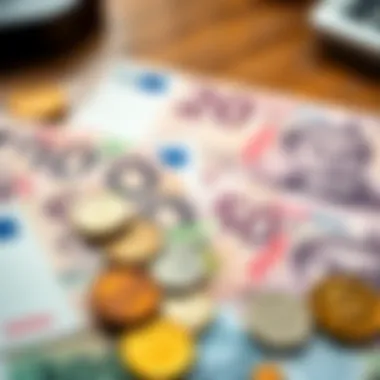
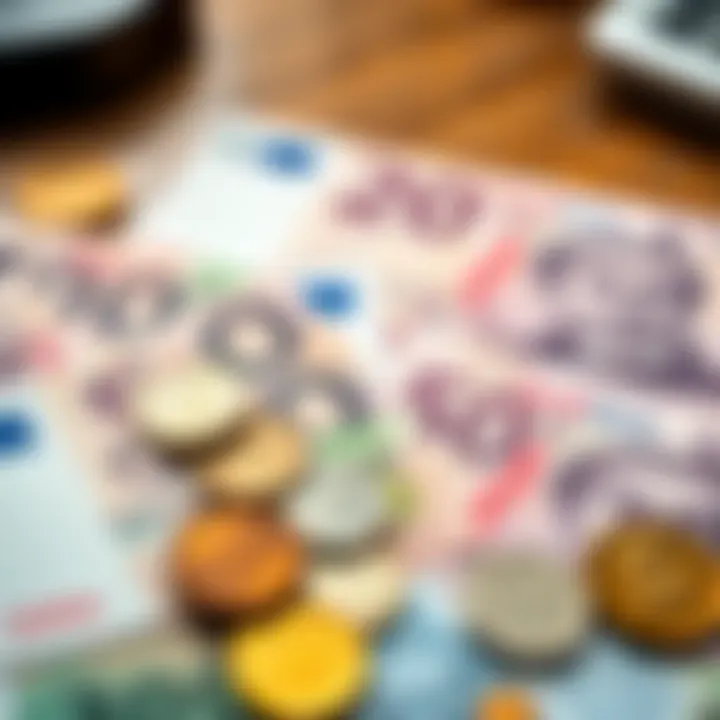
Intro
When it comes to money matters, the world of currency exchange can be a maze, especially when handling French euros and U.S. dollars. Whether you're gearing up for a trip to Paris or contemplating an investment in the European market, knowing how to convert French currency to USD is crucial. Not only does this task involve simple arithmetic, but it also demands an understanding of market dynamics, historical trends, and various financial terms that can leave even experienced traders scratching their heads.
This article aims to provide a thorough exploration into the nuances of currency conversion, especially focused on the transition from euros to American dollars. We'll examine myriad factors that can sway exchange rates, like political shifts, economic indicators, and cultural exchanges. Furthermore, we will delve into the practicalities involved in conversion, offering actionable insights for both travelers and investors. By the end, you'll come away with a more nuanced understanding of how to engage with international currencies effectively.
Now that we have set the stage, let’s dive into the foundational concepts that will guide our discussion.
Prolusion to Currency Conversion
Currency conversion is a pivotal topic in today’s globalized economy. Understanding how to navigate this intricate landscape can save individuals and businesses a significant amount of money while making informed decisions. Without grasping the nuances of converting currency, one can easily find themselves caught off guard by fluctuating rates, unexpected fees, and market volatility. This article aims to demystify the process of converting French money to US dollars, breaking it down into digestible segments to enhance comprehension.
The Importance of Understanding Currency Exchange
The currency exchange market is a bustling hub where transactions happen at lightning speed. Understanding how exchange rates work not only equips travelers with the knowledge they need to budget effectively but also helps investors in maximizing their returns.
- Budgeting for Travel: Tourists often underestimate the costs associated with currency conversion. Fees charged by banks, credit cards, and exchange establishments can add up quickly. With a bit of awareness and preparation, uninformed travelers can transform cumbersome charges into manageable expenses.
- Investment Decisions: For investors dabbling in international markets, knowing how to convert currency efficiently can significantly impact profit margins. A failure to account for currency exchange can vaporize profits overnight, leaving an investor in a lurch.
"Understanding currency exchange rates is akin to reading the fine print in a contract; it may seem tedious, but it could save you from financial pitfall."
Whether one is casually exchanging vacation funds or making strategic investment moves, having a clear understanding of the currency conversion landscape is essential.
Overview of French Money: The Euro
The Euro (€) is the official currency of the Eurozone, which consists of 19 of the 27 European Union countries, including France. Introduced in 2002, the Euro replaced the French Franc (FRF), marking a significant shift in monetary policy and economic structure within Europe.
- Symbol and Value: The Euro symbol is € and its value fluctuates against other currencies, most notably the US dollar. Factors influencing this value include economic performance, political stability, and inflation rates, which are important for anyone looking to convert money.
- Cultural Significance: The Euro represents not just a method of exchange, but a broader cultural and economic union among European countries. For many, it symbolizes stability and collective strength within the European Union.
Understanding the Euro in terms of its practical implications for currency conversion opens up a world of perspectives that go beyond mere numbers on a screen. It’s about recognizing its role as a facilitator of trade, travel, and investment.
Historical Context of French Currency
Understanding the historical dynamics of French currency is crucial for grasping how the euro, as the primary currency of France today, has evolved. History is a key player in shaping currency values and exchange rates, influenced by political tides, economic fluctuations, and societal shifts over time. This context isn't just relevant to currency trading; it also holds significance for travelers and investors alike. A sound understanding of these past changes enhances one's ability to make informed decisions in the present financial landscape.
The Transition from Franc to Euro
The shift from the French franc to the euro was monumental, representing a break from centuries of monetary tradition. Introduced in 2002, the euro aimed to unify European economies under a single currency, making cross-border trade simpler and more efficient. This transition wasn’t merely a change of paper; it was a signal of cooperation among nations.
Before the euro, the franc had been a cornerstone of French currency for over 600 years. As the currency of France, franc was deeply embedded in cultural and economic history. Transitioning to the euro involved considerable planning and public discourse. Many citizens faced apprehensions about losing their national currency. Those concerns were countered with the potential benefits of reduced exchange costs, price stability, and stronger international competitiveness.
Economically, the transition to the euro aimed to curb inflation and to stabilize the Member States’ economies. This change also reflected larger trends toward globalization and interdependence in the European Union.
- Pros of Transition:
- Cons of Transition:
- Economic interdependence strengthened.
- Enhanced financial stability across member countries.
- Elimination of exchange rate risk within the eurozone.
- Initial public resistance to currency change.
- Economic disparity among member states could influence unified monetary policy.
The seeds of this transition were planted by earlier agreements, such as the Maastricht Treaty, which established the Bedrock of monetary union in Europe. While the transition itself was executed with care, the impact of adopting the euro is still felt today in everything from business practices to personal finance strategies.
Impact of Historical Events on Exchange Rates
Historical events serve as a backdrop to the currency valuation processes. From wars to financial crises, these incidents have left their mark on the exchange rates, illustrating how external factors can guide currency value.
For example, the 2008 financial crisis shook economies worldwide, but its effects were particularly pronounced in the eurozone, where investors lost confidence. The euro took a hit against the dollar as uncertainty mounted, revealing just how interconnected today's financial markets are. Similarly, the Brexit vote in 2016 sent shockwaves through the currency markets, prompting shifts in exchange rates between the euro and the dollar as investors reassessed risk associated with European economic stability.
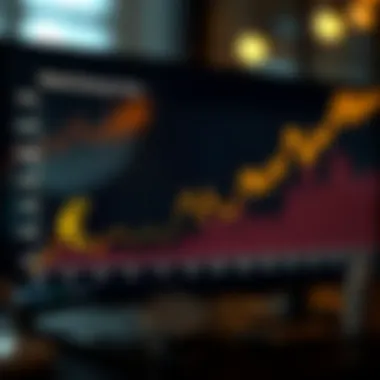
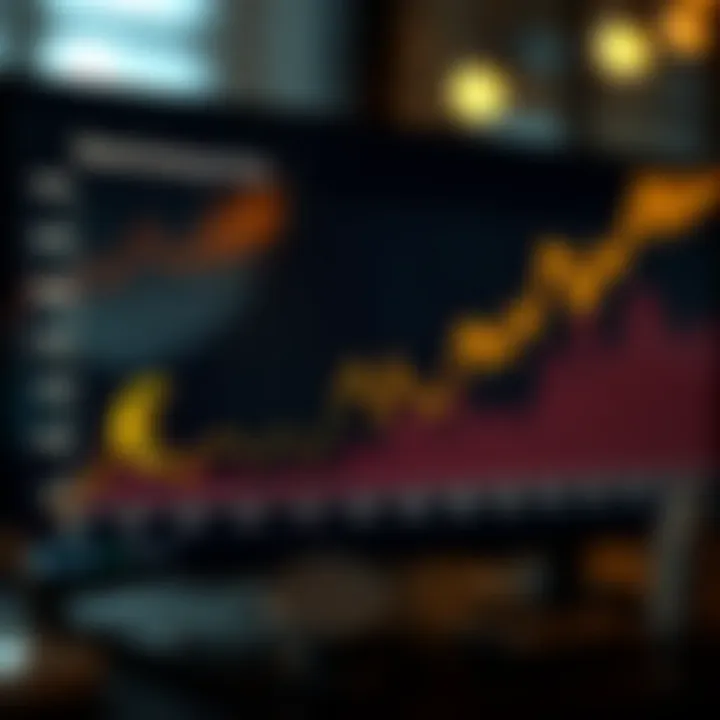
In addition, factors such as political instability within the region or changes in economic policy can dramatically influence the exchange rate. Investors often scrutinize relationship dynamics, like trade deals or diplomatic relations between nations, as these can lead to shifts in market sentiment.
Current Exchange Rate Dynamics
When delving into the mechanics of converting euros to US dollars, understanding the current exchange rate dynamics is crucial. The fluctuations in exchange rates can significantly affect the value one gets when converting currencies. Grasping these dynamics helps individuals and businesses make informed decisions, whether for travel, investments, or business transactions. By keeping tabs on fluctuations, one can identify optimal times to exchange currency, potentially saving a hefty sum, especially in larger transactions.
Factors Influencing Exchange Rates
At the core of exchange rate dynamics are several influential factors that sway how much one currency is worth against another. Let’s break it down into three significant components: inflation rates, political stability, and economic performance.
Inflation Rates
Inflation rates present a glaring example of how value can slip unnoticed through one's fingers. They reflect the rate at which general prices for goods and services are rising, leading to a decrease in purchasing power. A country dealing with high inflation will see its currency depreciate relative to others, as the economic landscape turns less attractive for investment.
- Key Characteristic: Such rates are often a harbinger of economic instability.
- Why It Matters: For individuals and investors, understanding inflation is vital. When inflation is high in the Eurozone, for instance, the euro may weaken against the dollar, affecting the conversion rate.
- Unique Feature: Inflation not only impacts currency value but can also signal shifts in monetary policy, which might encourage or discourage investment.
Political Stability
Currency values are not generated in a vacuum—they are sticky with the political climates of their respective countries. Political stability is paramount in ensuring a steady flow of investment and confidence.
- Key Characteristic: Investors generally favor countries that exhibit lower political risk.
- Why It Matters: A stable political environment in France, for instance, can strengthen the euro as it builds investor confidence. Conversely, turmoil in a nation can lead investors to flock to perceived safer assets, such as the US dollar, creating a downward pressure on the euro.
- Unique Feature: Political events—like elections or policy changes—can suddenly and dramatically alter exchange rates, making it essential to stay informed.
Economic Performance
Economic performance acts as the backbone of currency strength. Key indicators like GDP growth, unemployment rates, and trade balances play a vital role.
- Key Characteristic: A robust economy is often reflected in a strong currency.
- Why It Matters: Investors closely watch economic performance metrics. If France experiences economic growth while the US lags, the euro may strengthen relative to the dollar. Understanding these metrics is crucial for anyone involved in currency exchange or investment.
- Unique Feature: Economic performance is often intertwined with global events, such as trade agreements or recessions, that can significantly sway exchange rates.
Analyzing Recent Trends in Currency Conversion
In examining recent trends in currency conversion, one can see that exchange rates do not simply oscillate randomly. They respond to the intricacies of the global landscape, influenced by events from international trade issues to economic policies in major economies. The recent movements in the euro-dollar pair, for example, have suggested a wider adaptation strategy by traders and businesses alike, considering factors like the Federal Reserve's stance on interest rates versus the European Central Bank's adjustments.
Fluctuations in currency values often draw attention to new investment opportunities. As countries recover from economic downturns post-pandemic, looking at past trends helps in forecasting future paths for currency pairs.
In summary, to convert French euros to US dollars effectively, understanding the motivations behind exchange rate fluctuations is essential. With insights into inflation, political stability, and economic performance, individuals can navigate the complex waters of currency conversion more adeptly.
Conversion Mechanisms and Methods
In the realm of financial transactions, understanding conversion mechanisms is paramount, as they form the backbone of how foreign currencies, in this context, French money, are turned into US dollars. Familiarity with these mechanisms is not merely an academic pursuit; it has real-world implications for travelers, investors, and anyone engaged in international commerce. Given the volatile nature of currency markets, recognizing the various methods available can mean the difference between a profitable investment and a costly mistake.
There are several avenues for currency conversion, each with its unique benefits and drawbacks. Keeping these factors in mind allows individuals to make informed decisions about their currency exchange needs, ultimately affecting their financial standing depending on their individual circumstances. Unpacking the nuanced differences among these methods lays the groundwork for effective financial interactions on a global scale.
Direct Currency Conversion Online
In today’s digital landscape, direct currency conversion online has become a go-to method for those looking to exchange currencies efficiently. A myriad of websites and apps offer real-time exchange rates and can instantly convert French Euros to USD at the click of a button. This convenience cannot be overstated. Plus, many online tools go beyond simple conversion; they often provide additional features like historical data, trends, and even alerts for specific exchange rates.
A significant advantage of using online converters is the access to competitive rates, which may often be better than traditional methods. However, it's crucial to remain vigilant. Some websites may charge hidden fees, or provide rates that differ significantly from what one might find at a bank or exchange service.
One point to note is the varying accuracy of these converters. Not all platforms update their rates with the same frequency; some might lag during high-volatility periods, resulting in less favorable rates. Therefore, it’s wise to compare multiple sources before settling on a transaction.
Currency Exchange Services: Pros and Cons
When considering currency exchange services, there’s a wide array of options ranging from local stores to specialized money changers. Engaging with these services can be beneficial, particularly when cash is needed for immediate expenses during foreign travel. However, like anything, there are pros and cons to weigh.
Pros Include:
- Familiarity and accessibility: Many individuals feel more comfortable using a physical location for exchanges, especially when they require cash in hand.
- Immediate transactions: Unlike online methods, where delays may occur, cash exchanges provide instant gratification and certainty.
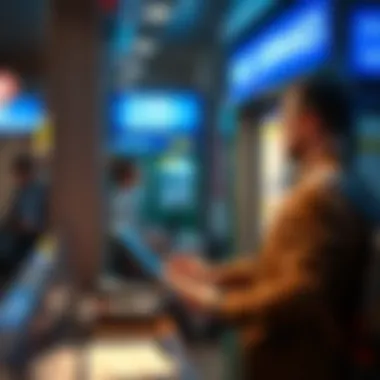

On the flip side, Cons Might Be:
- Potentially higher rates: Often, physical currency exchange services charge higher fees based on their operating costs and the need to make a profit.
- Limited availability: Not all locations provide competitive rates, and finding a reputable service can vary by region.
Before making a transaction, it’s advisable to do some light research to find the best currency exchange service that strikes a balance between convenience and cost-effectiveness.
Using Banks vs. Forex Platforms
The debate between using banks and Forex platforms for currency conversion is ongoing, and for good reason. Each venue offers distinct advantages suited for different types of users. Understanding these nuances is critical for making risk-averse financial choices.
Banks are generally a safe bet. They have established procedures and credible reputations, which often translates to trustworthiness. Furthermore, banks offer larger limits, making them suitable for significant transactions. However, there seem to be various hidden costs and fees that can eat away at the exchange rate provided.
In contrast, Forex platforms cater to those who require a more flexible and often more competitive approach to currency trading. These platforms enable users to access live market trading, offering potentially better rates and lower fees compared to banks. However, they come with drawbacks, primarily the need for a better comprehension of market dynamics. For the uninitiated, navigating Forex may seem like a daunting task.
Choosing between the two ultimately hinges on individual needs. Travelers looking for convenience might prefer banks, while savvy investors seeking to maximize returns might lean towards Forex platforms.
In summary, whether choosing online converters, physical currency exchange services, or navigating the complex waters of banks and Forex platforms, understanding the methods of currency conversion is essential. Each option has its place, showing that what works for one may not work for another, emphasizing the need for careful consideration in the world of foreign exchange.
Understanding Conversion Fees
When it comes to buying and selling currency, conversion fees are the often hidden gremlins that can dent your budget without you even noticing. Understanding these fees is critical, especially in the context of converting French euros to US dollars. For travelers and investors alike, being aware of these costs can facilitate better financial planning and potentially save a significant amount of money. After all, every cent counts, whether you're planning a holiday in Paris or considering investments overseas.
Conversion fees encompass various costs associated with exchanging one currency for another. Knowing what these fees are and how to navigate around them can enhance your overall experience, regardless of your reason for currency exchange. If you're not paying attention, these costs can pile up like laundry on a busy Sunday, leading to unexpected expenses that can turn a manageable budget into a financial squeeze.
At the heart of currency conversion lies the actual exchange rate, but on top of that lays a layer of fees that can impact the actual amount you end up with. Understanding these elements is fundamental to making informed choices about your money.
Types of Fees Associated with Currency Conversion
- Transaction Fees: These are charges imposed by banks or currency exchange services for processing your currency exchange. Though they might seem negligible on individual transactions, they can add up over time, especially for frequent exchanges.
- Service Fees: Some agencies tack on a separate service fee just for the privilege of using their exchange services. Think of it as a small wave goodbye as your money heads out the door. This fee is often a flat rate, which might not seem like much on paper, but can be significant when dealing with larger sums.
- Exchange Rate Markup: Frequently, companies will offer an exchange rate that’s less favorable than the market rate to cover their costs. This markup can be a stealthy way to eat into your exchange budget longer than you might expect. Keep an eye on what the market rate is before you exchange, as knowing will help you gauge how much extra you may be paying.
- ATM Fees: If you’re withdrawing cash abroad, many ATMs will charge a fee for international withdrawals. On top of that, your home bank might also impose its own fee. Sometimes you might think of using just one machine, but the fees can be eye-popping if you're not careful.
Understanding these fees goes a long way in ensuring you're not left scratching your head when you see dwindling amounts in your pocket or bank accounts after an exchange.
"An ounce of prevention is worth a pound of cure." – Being mindful of fees before you dive into currency conversion can save you headaches later.
How to Minimize Conversion Costs
Navigating the maze of currency conversion fees can feel like trying to find your way out of a corn maze – tricky at best. But with a few strategies, you can sidestep those pitfalls that drain your funds.
- Choose your Providers Wisely: Not all banks or exchange services are created equal. Comparing rates and fees is essential. Research has shown that some banks and online platforms have lower fees than traditional exchange services.
- Use Currency Conversion Apps: With the rise of technology, numerous apps can help you stay updated on real-time exchange rates. Apps like XE Currency or OANDA can give clear insights into where the rates stand and help you identify the best time to convert.
- Avoid Airport Exchanges: The exchange booths at airports tend to sport the most exorbitant fees and rates. If you can hold off on exchanging until you are in a more favorable location, it might save you a pretty penny.
- Consider Using Credit Cards: Many credit cards offer favorable exchange rates with little to no foreign transaction fees. Just be cautious and read the fine print, as not every card will have the same terms.
- Do Your Homework: Keeping track of the trends and fluctuations of currency values can aid in timing your conversions better. Sometimes it's all about knowing when to pull the trigger.
In summary, if you remain vigilant regarding conversion fees and employ smart strategies, you can stretch your euros further than you initially thought possible. With knowledge and preparation, you'll maneuver through the currency conversion landscape like a seasoned traveler.
Implications for Travelers and Investors
Understanding how to convert French money to USD brings significant implications for both travelers and investors. Currency conversion is not just a matter of exchanging physical money; it influences budgeting, purchasing power, and investment strategies. For travelers, knowing how and when to exchange currency can mean the difference between a comfortable trip or one that feels financially strained. As for investors, navigating currency fluctuations can open up opportunities that might not be visible without a sound understanding of international finance.
A comprehensive grasp of conversion rates and associated costs allows individuals to make informed decisions, whether planning a family vacation to France or expanding an investment portfolio. It empowers them to avoid pitfalls related to hidden fees and unfavorable exchange rates, thereby maximizing their resources.
"In the world of finance, knowledge is not just power; it's money."
Travel Budgeting: Avoiding Hidden Conversion Costs
Traveling to France is a dream for many, but when it comes to budgeting for the trip, overlooking hidden conversion costs can lead to financial surprises. Exchange rates fluctuate continuously due to several factors, meaning that the rate one receives today might differ dramatically from what you get tomorrow. This unpredictability can be a head-scratcher, particularly when you consider how it affects the overall cost of your trip.
To effectively manage your travel budget:


- Research Ahead of Time: Stay informed about the current exchange rate between the Euro and USD. Websites like XE provide real-time updates and can help you monitor trends.
- Plan Currency Exchange Strategically: Rather than haphazardly exchanging all your money at once, consider doing it in stages. This might help you mitigate potential losses.
- Use ATMs Wisely: Withdraw cash directly in Euros to avoid high conversion fees typically charged at currency exchange kiosks or banks.
- Keep an Eye on the Fees: Some services will charge high commission fees. Be clear on what these fees are before proceeding with the exchange.
By undertaking a little bit of research and planning, you can stretch your dollars further, ensuring a more enjoyable experience in France.
Investment Strategies Involving Currency Exchange
Investing in foreign markets presents exciting opportunities but also comes with its challenges, particularly concerning currency exchange. Investors looking to tap into European markets must pay close attention to currency fluctuations, as they can significantly impact returns. The French market, with its diverse options ranging from established companies to startups, provides ample opportunities for savvy investors.
To engage effectively in investments involving currency exchange, consider the following strategies:
- Hedge Against Currency Risk: Investors might utilize foreign exchange options and futures to hedge against unfavorable currency movements. This can protect investments from unpredictable rate changes.
- Diversification: Spread investments across different currencies. A diversification strategy reduces the risk associated with a single economy's currency fluctuations.
- Monitor Economic Indicators: Stay updated on inflation rates, interest rates, and political stability, all of which can influence currency values. Resources such as Investopedia can be a valuable guide here.
- Consider Local Market Dynamics: Understand how local economic situations—and their relation to currency values—impact companies you’re investing in.
Engaging with currency exchange thoughtfully can amplify your financial reach, allowing you to capitalize on various market dynamics while minimizing risks associated with currency degradation.
Future Projections in Currency Exchange
Understanding future projections in currency exchange is essential for anyone who is seriously considering investment or travel between regions. The currency market is tricky, beset by influences that can shift from one day to the next. Factors such as economic indicators, political changes, and investor sentiments can cause fluctuations in exchange rates, making projections somewhat akin to navigating tides that can rise or fall at a moment's notice.
Importance of Future Projections
Future projections offer insights into what the market might look like, which can significantly aid decision-making for investors and travelers. Knowing potential exchange rate trends can allow individuals to time their currency exchanges strategically. It can also help in budgeting for travel and investments. Understanding these dynamics can save one from experiencing unexpected financial loss.
Predictive Factors to Consider:
- Economic Performance: A country demonstrating strong economic growth often leads to a stronger currency. If France's GDP is on the upswing, that might suggest a strengthening euro against the dollar in the near future.
- Geopolitical Events: Situations such as elections, trade deals, and international conflicts can affect investor confidence, thus impacting currency strength.
- Inflation Rates: Countries with lower inflation rates than others will see an appreciation in currency value over the long term, meaning that inflation levels in France compared to the United States could influence future projections for the euro.
"In currency exchange, being prepared for fluctuations is often more essential than predicting them correctly."
Expert Opinions on Currency Fluctuations
Experts in finance often analyze myriad factors to project currency fluctuations. They may utilize economic data, historical trends, and even market sentiment to form educated guesses about future values. Notably, some market analysts argue that the upcoming trends in currency exchange are likely to correlate closely with the world’s economic climate.
Key Insights from Analysts:
- Analysts predict that as global trade shifts, the euro may experience periods of both growth and decline, reflecting Europe's shifting economic forecast.
- Experts also note that the psychological aspect of trading—how traders perceive news and events—plays a critical role in currency valuation. For this reason, emotional reactions to events like changes in government policy or international treaties can lead to substantial currency fluctuations.
Technological Innovations Shaping Currency Exchange
Technological advancements are continuously shaping the way currency trading is done. Online platforms and apps have made currency conversion easier than ever, making it possible for everyday users to get real-time conversion rates at their fingertips. Tech, however, doesn't just simplify transactions; it also introduces tools for analytics.
Emerging Technologies:
- Blockchain Technology: Cryptocurrencies, which are based on blockchain technology, can impact traditional currency exchange rates. The rise of digital currencies might, in future, create a divergence in how various currencies compare against each other.
- AI and Data Analytics: Artificial intelligence is being harnessed to create algorithms that analyze trading patterns, possibly leading to more accurate predictions of future currency value fluctuations.
The ongoing development in technology brings new players into the currency exchange arena, adding layers of complexity but also new opportunities for those who are savvy enough to understand these shifts. As traditional and digital currency models begin to overlap, investors may find new strategies emerging.
Future projections in currency exchange are not merely academic musings; they bear significant practical implications. Whether you’re planning to invest or travel, staying informed about these trends can empower informed decision-making and encourage strategic financial planning.
Finale
In wrapping up this exploration into the conversion of French money to USD, the significance of understanding this topic is undeniably profound. Currency conversion stands as a vital skill for travelers, investors, and anyone engaged in the global economy. As global interactions become more intertwined, grasping the nuances of currency exchange isn't just helpful; it's essential for making informed financial decisions.
Recap of Key Points
To summarize, several critical aspects emerge from our analysis:
- Historical Context: Knowing the shift from the Franse to the Euro provides a backdrop that informs current exchange rates.
- Exchange Rate Dynamics: Factors such as inflation, political stability, and economic performance significantly influence how different currencies stack against each other.
- Conversion Mechanisms: We discussed various methods for converting currency, including online platforms, banks, and, Forex services, each with their respective pros and cons.
- Fees and Costs: Understanding the types of fees associated with conversions can save money and enhance the overall transaction experience.
- Implications for Travelers and Investors: Recognizing the potential hidden costs in travel and investment strategy formation leads to better planning and budgeting.
- Future Insights: Technological innovations and expert opinions highlight the shifting landscape of currency exchange, making continuous learning about the subject imperative.
Final Thoughts on Navigating Currency Conversion
Navigating the complex world of currency conversion requires a blend of knowledge, skill, and alertness. As rates fluctuate and markets change, staying aware of economic indicators and employing the right tools can lead to substantial savings and gains.
It's worth remembering that each transaction isn't just a mere exchange of currency but rather a blend of art and science. Mastering this understanding puts you in a stronger position, especially in uncertain economic climates.
"Financial literacy is not just about knowing numbers, but understanding the concepts that drive them."















